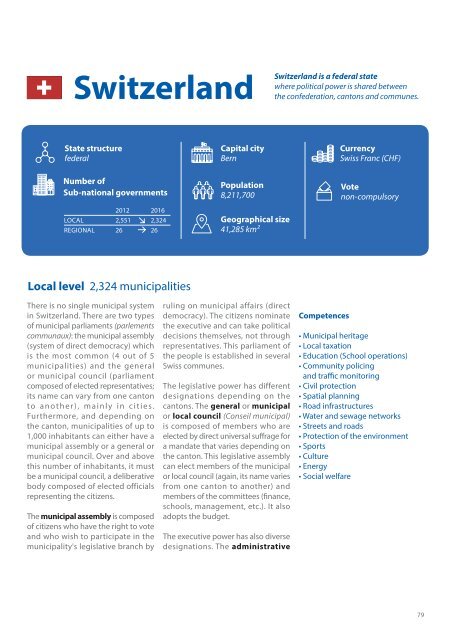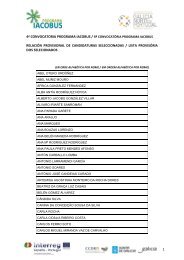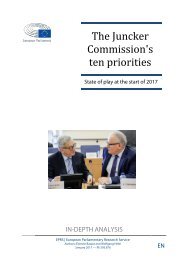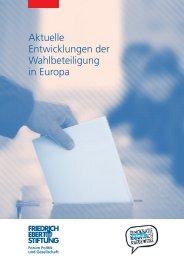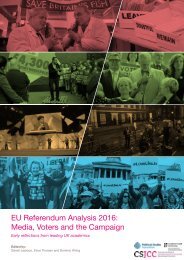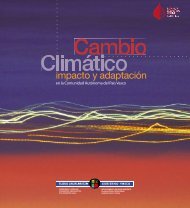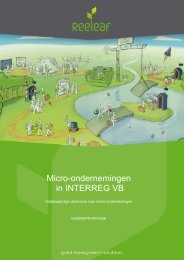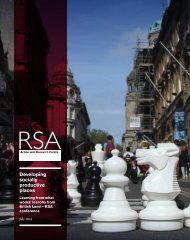Local and Regional Governments in Europe
CEMR_structures_and_competences_2016_EN
CEMR_structures_and_competences_2016_EN
You also want an ePaper? Increase the reach of your titles
YUMPU automatically turns print PDFs into web optimized ePapers that Google loves.
Switzerl<strong>and</strong><br />
Switzerl<strong>and</strong><br />
is a federal state<br />
where political power is shared between<br />
the confederation, cantons <strong>and</strong> communes.<br />
State structure<br />
federal<br />
Number of<br />
Sub-national governments<br />
2012 2016<br />
LOCAL 2,551 2,324<br />
REGIONAL 26 26<br />
Capital city<br />
Bern<br />
Population<br />
8,211,700<br />
Geographical size<br />
41,285 km²<br />
Currency<br />
Swiss Franc (CHF)<br />
Vote<br />
non-compulsory<br />
<strong>Local</strong> level 2,324 municipalities<br />
There is no s<strong>in</strong>gle municipal system<br />
<strong>in</strong> Switzerl<strong>and</strong>. There are two types<br />
of municipal parliaments (parlements<br />
communaux): the municipal assembly<br />
(system of direct democracy) which<br />
is the most common (4 out of 5<br />
municipalities) <strong>and</strong> the general<br />
or municipal council (parliament<br />
composed of elected representatives;<br />
its name can vary from one canton<br />
to another), ma<strong>in</strong>ly <strong>in</strong> cities.<br />
Furthermore, <strong>and</strong> depend<strong>in</strong>g on<br />
the canton, municipalities of up to<br />
1,000 <strong>in</strong>habitants can either have a<br />
municipal assembly or a general or<br />
municipal council. Over <strong>and</strong> above<br />
this number of <strong>in</strong>habitants, it must<br />
be a municipal council, a deliberative<br />
body composed of elected officials<br />
represent<strong>in</strong>g the citizens.<br />
The municipal assembly is composed<br />
of citizens who have the right to vote<br />
<strong>and</strong> who wish to participate <strong>in</strong> the<br />
municipality's legislative branch by<br />
rul<strong>in</strong>g on municipal affairs (direct<br />
democracy). The citizens nom<strong>in</strong>ate<br />
the executive <strong>and</strong> can take political<br />
decisions themselves, not through<br />
representatives. This parliament of<br />
the people is established <strong>in</strong> several<br />
Swiss communes.<br />
The legislative power has different<br />
designations depend<strong>in</strong>g on the<br />
cantons. The general or municipal<br />
or local council (Conseil municipal)<br />
is composed of members who are<br />
elected by direct universal suffrage for<br />
a m<strong>and</strong>ate that varies depend<strong>in</strong>g on<br />
the canton. This legislative assembly<br />
can elect members of the municipal<br />
or local council (aga<strong>in</strong>, its name varies<br />
from one canton to another) <strong>and</strong><br />
members of the committees (f<strong>in</strong>ance,<br />
schools, management, etc.). It also<br />
adopts the budget.<br />
The executive power has also diverse<br />
designations. The adm<strong>in</strong>istrative<br />
Competences<br />
• Municipal heritage<br />
• <strong>Local</strong> taxation<br />
• Education (School operations)<br />
• Community polic<strong>in</strong>g<br />
<strong>and</strong> traffic monitor<strong>in</strong>g<br />
• Civil protection<br />
• Spatial plann<strong>in</strong>g<br />
• Road <strong>in</strong>frastructures<br />
• Water <strong>and</strong> sewage networks<br />
• Streets <strong>and</strong> roads<br />
• Protection of the environment<br />
• Sports<br />
• Culture<br />
• Energy<br />
• Social welfare<br />
79


